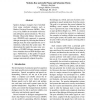Free Online Productivity Tools
i2Speak
i2Symbol
i2OCR
iTex2Img
iWeb2Print
iWeb2Shot
i2Type
iPdf2Split
iPdf2Merge
i2Bopomofo
i2Arabic
i2Style
i2Image
i2PDF
iLatex2Rtf
Sci2ools
ACL
2000
2000
Spoken Dialogue Management Using Probabilistic Reasoning
Spoken dialogue managers have benefited from using stochastic planners such as Markov Decision Processes (MDPs). However, so far, MDPs do not handle well noisy and ambiguous speech utterances. We use a Partially Observable Markov Decision Process (POMDP)-style approach to generate dialogue strategies by inverting the notion of dialogue state; the state represents the user's intentions, rather than the system state. We demonstrate that under the same noisy conditions, a POMDP dialogue manager makes fewer mistakes than an MDP dialogue manager. Furthermore, as the quality of speech recognition degrades, the POMDP dialogue manager automatically adjusts the policy.
| Added | 01 Nov 2010 |
| Updated | 01 Nov 2010 |
| Type | Conference |
| Year | 2000 |
| Where | ACL |
| Authors | Nicholas Roy, Joelle Pineau, Sebastian Thrun |
Comments (0)

